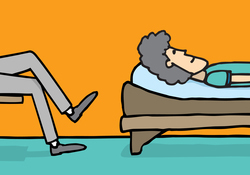Millions of people use marijuana as medicine. Many of them even enjoy the high. So what? That is just a bonus, because how many people really enjoy the side effects of their prescription drugs? It drives me crazy when people say marijuana isn’t medicine.
I have read a lot of research. I am not making this up. Scientific evidence has proven that cannabis is an extremely effective treatment in many areas, including but in no way limited to what I like to call the big three: Analgesic, Anti-inflammatory, and Neuroprotectant.
1. As an Analgesic = painkiller.
Cannabis is used successfully as an analgesic. Popular and recognizable drugs used in this category are:
- NSAIDs – asprin, ibupropen, naproxen, acetametaphine
- Opiates – from the poppy plant such as morphine, codeine, opium
- Opioids – synthesized opiates such as oxycontin, oxycodone, hydrocodone
 Psychotropic – sleep aids (like ambien, lunesta), stimulants (like ritalin), antidepressants (like prozac), anticonvulsants, antipsychotics sedatives, barbituates – and on and on – you get the picture here. All these are commonly prescribed drugs that come with pretty nast side effects.
Psychotropic – sleep aids (like ambien, lunesta), stimulants (like ritalin), antidepressants (like prozac), anticonvulsants, antipsychotics sedatives, barbituates – and on and on – you get the picture here. All these are commonly prescribed drugs that come with pretty nast side effects.- Topical (goes on your body, not in it, usually) – novacaine, capsaicin, lidocaine, cocaine; cocaine is a Schedule 1 Drug – just like cannabis, and is smoked – like with crack/cocaine, snorted like snuff, or taken in the vein.
- Atypical – gabapentin, pregabalin (Lyrica), orphenadrine and many more). This is a wide range of “others”. These drugs are often used along with the previously mentioned analgesics, and include some forms of antidepressants, muscle relaxants and antihistamines to name just a few. Drugs in this category may have the same name/type as drugs in other category, but have a different make-up, for example, Lyrica. Lyrica is used as an antidepressant, and a nerve pain blocker, but it is very different than the other drugs typically in those categories, thus it’s atypical. It’s an antidepressant, but not a psychotropic drug. I sure hope that makes sense.
Opiates/Opioids – are pain blockers, not anti-inflammatory drugs. These do nothing for inflammation per se, but will eliminate or seriously lessen many kinds of pain, even pain due to inflammation. They will often come with built in anti-inflammatory drugs, (like Percocet which is oxycodone with acetaminophen, and Percodan, oxycodone with aspirin). They are very effective, but shouldn’t be considered a permanent cure. And as anyone who has had to take these on a regular basis, they’re not without their risks and I don’t think I need to elaborate.
2. As an Anti-Inflammatory = reduces inflammation. Cannabis is used successfully as an anti-inflammatory.
NSAIDs (non-steroidal anti-inflammatory drugs), reduce inflammation which is a common cause of pain. Nearly half of all analgesic drugs are anti-inflammatory and so is cannabis. Steroids like Prednisone are often prescribed for inflammation, but are really only safe to take for the short term. Long term use of steroids is a dangerous thing and can lead to more pain issues in the future. Most NSAIDs have risks, like digestive issues, and liver and kidney issues. The most common anti-inflammatory drugs in most households are aspirin and ibuprofen. I can’t take either.
 3. As a Neuroprotectant – It’s harder for me to define this category, but I’ll try. Oh, and Cannabis is used successfully as a neuroprotectant. Just as the name implies, neuroprotectants protect neurons. The central nervous system’s neurons are signal switches responsible for too many things for me to even fathom. It’s easier to give examples of some of the more common CNS ailments because this is such a wide topic, and a frontier of medicine that has lots of unknowns. Ailments like, Multiple Sclerosis, Alzheimer’s, Diabetic Neuropathy, Lou Gehrig’s Disease (ALS), Parkinson’s Disease, Epilepsy, and even ADHD are the most commonly known afflictions of the Central Nervous System. Neurons are either in degeneration or generally misbehaving in all these ailments. New drugs are being researched and developed as we speak to address these afflictions, but I suspect that they will come with some pretty nasty side effects, as is the case with the present drugs in this category, so doctors must decide if the benefit of the drugs they wish to prescribed outweigh the side effects. I’m happy to report that medical cannabis research shows that it can be an effective neuroprotectant and is already being used, with much success, to treat all of the mentioned diseases and others like them. THC and CBD, (both cannabinoids) can neutralize, repair, and block further damage to many CNS malfunctions. I know I am over simplifying this all, but I am a simple person just trying to make something very complicated easier to understand.
3. As a Neuroprotectant – It’s harder for me to define this category, but I’ll try. Oh, and Cannabis is used successfully as a neuroprotectant. Just as the name implies, neuroprotectants protect neurons. The central nervous system’s neurons are signal switches responsible for too many things for me to even fathom. It’s easier to give examples of some of the more common CNS ailments because this is such a wide topic, and a frontier of medicine that has lots of unknowns. Ailments like, Multiple Sclerosis, Alzheimer’s, Diabetic Neuropathy, Lou Gehrig’s Disease (ALS), Parkinson’s Disease, Epilepsy, and even ADHD are the most commonly known afflictions of the Central Nervous System. Neurons are either in degeneration or generally misbehaving in all these ailments. New drugs are being researched and developed as we speak to address these afflictions, but I suspect that they will come with some pretty nasty side effects, as is the case with the present drugs in this category, so doctors must decide if the benefit of the drugs they wish to prescribed outweigh the side effects. I’m happy to report that medical cannabis research shows that it can be an effective neuroprotectant and is already being used, with much success, to treat all of the mentioned diseases and others like them. THC and CBD, (both cannabinoids) can neutralize, repair, and block further damage to many CNS malfunctions. I know I am over simplifying this all, but I am a simple person just trying to make something very complicated easier to understand.
It would be nice if your doctor had this information for you, but don’t count on it. You have to take on some responsibility here and find it yourself. It’s important for you to gather your own information for your particular malfunction and see what research and testimony you can find about your ailment with regard to marijuana, and how it relates to you. You own this, and I can’t overemphasis this enough.
After you’ve done enough research I think you will come up with at least two conclusions the same as mine; that the pharmaceutical industry 1) has much to be feared from cannabis, and 2) is instrumental in the war against marijuana legalization.
Next up – Marijuana and Cancer. It’s not just for chemo patients anymore.
